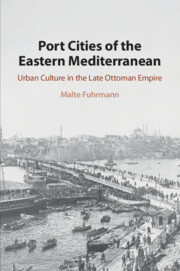Book contents
- Port Cities of the Eastern Mediterranean
- Port Cities of the Eastern Mediterranean
- Copyright page
- Contents
- Figures and Table
- Acknowledgments
- Part I Introduction
- Part II Constructing Europe
- Part III The City’s New Pleasures
- Part IV Identities on the Mediterranean Shore
- Part V The End of the European Dream
- Part VI Europe and the Eastern Mediterranean Revisited
- Bibliography
- Index
Part V - The End of the European Dream
Published online by Cambridge University Press: 09 October 2020
- Port Cities of the Eastern Mediterranean
- Port Cities of the Eastern Mediterranean
- Copyright page
- Contents
- Figures and Table
- Acknowledgments
- Part I Introduction
- Part II Constructing Europe
- Part III The City’s New Pleasures
- Part IV Identities on the Mediterranean Shore
- Part V The End of the European Dream
- Part VI Europe and the Eastern Mediterranean Revisited
- Bibliography
- Index
Summary
Contextualizing the “unraveling” of the Thalassocentric order in the “Age of Anger” (Pankaj Mishra), I examine the Ottoman elites’ “reverse Orientalism” (Erdal Kaynar), the endemic “economies of violence” (Tolga Esmer), and most especially the process of marginalization of some groups of Europeans that paved the way to deconstructing the Europeanization paradigm all together. I claim that unlike some other world regions, Eastern Mediterranean urban society did not bring forth an outright autochthonous intellectual rejection of the West, as it was too closely intertwined with it. There were other forms of rejections though. This was on the one hand the endemic violence in the countryside that threatened material possessions and the well-being of foreigners. Moreover, intercommunal violence could target foreigners and especially consuls, as became evident in the St. George’s Day riots of 1876. Whereas the success of such violence was limited, European dominance in the Eastern Mediterranean was not so much challenged but deconstructed. My example of such a process is the Ottoman campaign targeting the reputation of European women on moral grounds, which provokes the European-led campaigns against the “white slave trade.” Finally, following the moral erosion of the dream of the port cities pertaining to Europe, I trace the steps of their violent disassociation from the Thalassocentric order and the subsequent steps of bringing them into a nation-state order.
Keywords
- Type
- Chapter
- Information
- Port Cities of the Eastern MediterraneanUrban Culture in the Late Ottoman Empire, pp. 345 - 404Publisher: Cambridge University PressPrint publication year: 2020

